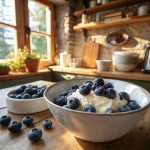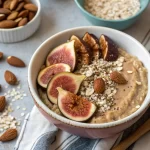A thick, creamy yogurt made from just two ingredients: fresh milk and live cultures. Slowly fermented for optimal texture and probiotic content, this yogurt is a rich source of protein, calcium, and beneficial bacteria.
Preparation Time
- Active time: 15 minutes
- Fermentation time: 8–12 hours
- Straining time: 2–4 hours (optional, for Greek-style thickness)
- Total time: 10–16 hours (mostly passive)
- Servings: 4 (about 1 cup each)
Ingredients
- 1 liter (about 4 cups) whole milk (preferably organic or pasture-raised)
- 2 tablespoons plain yogurt with live active cultures (unsweetened, no flavors)
Instructions
- Heat the milk in a saucepan over medium heat until it reaches 85 °C (185 °F). This helps denature proteins for a thicker final texture.
- Remove from heat and allow to cool to 43–45 °C (110 °F)—the optimal range for culturing.
- Gently whisk in the yogurt starter until fully incorporated.
- Pour the mixture into a clean glass or ceramic container. Cover with a clean towel and let it ferment undisturbed in a warm, draft-free area (such as an oven with the light on) for 8 to 12 hours.
- Once set, for Greek yogurt consistency, strain through a clean cloth or nut milk bag for 2–4 hours in the fridge.
- Transfer to airtight jars. Store in the refrigerator for up to 7 days.
Estimated Nutritional Value (Per 1 Cup Serving)
| Nutrient | Approximate Value |
|---|---|
| Calories | 140 kcal |
| Protein | 18 g |
| Fat | 7 g |
| Carbohydrates | 6 g |
| Natural sugars | 5 g |
| Calcium | 200 mg |
| Live cultures | present (varies) |
Based on whole milk and plain fermentation.
Health Benefits
Gut and immune support
Greek yogurt contains live probiotic cultures such as Lactobacillus and Bifidobacterium, which balance gut flora and support immune defenses.
Reference: Ouwehand AC et al. (2002). Probiotic and other functional microbes. International Dairy Journal.
High digestibility and satiety
Fermentation breaks down lactose, making yogurt easier to digest for many people. Its combination of protein and fat promotes satiety and blood sugar stability.
Source: Walter J. (2008). Ecology of intestinal probiotics. Annals of Nutrition & Metabolism.
Bone and nervous system health
Greek yogurt is a rich source of bioavailable calcium and vitamin B12, essential for bone strength and neurological function.
Reference: Heaney RP. (2009). Calcium in human health. Nutrition Today.
Cooking Tips
- Use the best quality milk you can find, preferably non-ultrapasteurized for better culturing.
- Do not disturb the yogurt during fermentation, as movement can disrupt the setting process.
- For a more tangy flavor, ferment longer (12 hours); for a milder taste, ferment 8 hours.
- The strained liquid (whey) is rich in nutrients—use it in smoothies, bread, or vegetable ferments.
- Save 2 tablespoons of your finished yogurt to use as a starter for the next batch.







0 comments on “Homemade Greek Yogurt”Add yours →